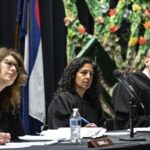By 2-1, appeals court takes no issue with constitutional violation from defendant’s absence at hearing

Colorado’s second-highest court, by a 2-1 vote, concluded that an Adams County judge’s order granting crime victim restitution was valid, even though the defendant was absent from a hearing which he had a constitutional right to attend.
The U.S. and Colorado constitutions guarantee criminal defendants the right to be present at all “critical stages” of their prosecution. A hearing where judges impose restitution on defendants is one of those critical stages.
After pleading guilty to assault, prosecutors requested that Dean Lonneburg pay $462 in restitution. At a July 2024 hearing, Lonneburg was not present, and it was unclear whether Lonneburg was aware of the proceedings.
The defense attorney did not believe they could continue in Lonneburg’s absence.
“Well, I’m going to go ahead and grant the motion to impose restitution that was filed,” responded District Court Judge Sean Finn. “I do think that, as I think everybody has stated at this point, Mr. Lonneburg has a right to be present. But the fact that he is not present does not prevent us from going forward.”
Case: People v. Lonneburg
Decided: September 25, 2025
Jurisdiction: Adams County
Ruling: 2-1
Judges: Grant T. Sullivan (author)
Craig R. Welling
Christina F. Gomez (dissent)
On appeal, Lonneburg challenged Finn’s decision to impose restitution in his absence. A three-judge panel for the Court of Appeals agreed in a Sept. 25 opinion that Lonneburg had a constitutional right to be present, but concluded his absence was “harmless beyond a reasonable doubt.”
First, Lonneburg’s lawyer was there to represent him, wrote Judge Grant T. Sullivan for himself and Judge Craig R. Welling.
“Second, the record shows that Lonneburg’s presence at the hearing likely wouldn’t have been useful or would have only been ‘slightly beneficial,'” Sullivan continued.
Moreover, there was no new evidence at the hearing, Lonneburg did not mention any additional evidence on appeal that he would have presented and Lonneburg had already agreed to pay restitution.
Judge Christina F. Gomez dissented, arguing it was challenging to know what would have happened if Lonneburg had been in the room.
“I believe there is a reasonable possibility that the district court may have entered restitution in a different amount had it continued the hearing until Lonneburg could be present,” she wrote.
Gomez elaborated that Lonneburg could have clarified the details of his assault or disputed the prosecution’s requested amount himself.
“All of this may seem speculative. And, indeed, the majority relies in part on the fact that Lonneburg doesn’t assert, even on appeal, that he would have presented evidence to challenge the requested amount. But there is nothing in the record one way or the other because of the violation of Lonneburg’s rights: He wasn’t there,” she wrote. “I can’t agree that we should hold the absence of evidence in the record against Lonneburg.”
The case is People v. Lonneburg.












